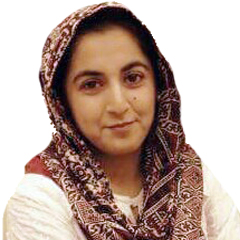While culture is an integral part of a society’s identity, it is not immune to change. As societies evolve, so must their cultural practices. In Pakistan, the uncritical promotion of culture often comes at the expense of individual freedoms and rights. It is not right to blindly celebrate cultural traditions.
It is high time that we evaluate our traditions for their impact on society and abandon the traditions that perpetuate inequality, violence, or discrimination in favour of practices that promote inclusivity, respect, and progress. The preservation of culture should not come at the cost of human rights and dignity.
Pakistan’s cultural landscape is deeply entrenched in patriarchal norms that present a dichotomy for women, especially within marriage. These norms oscillate between modern aspirations and traditional expectations, creating a conflict that disproportionately impacts women.
Marriage is often perceived as a pivotal milestone for women in Pakistan, overshadowing personal achievements such as education and career. Societal pressures compel women to conform to predefined roles of wives and mothers, limiting their personal growth and aspirations. This societal expectation eventually leads to early marriages, with approximately 21 percent of girls married before the age of 18, curtailing their educational and personal development opportunities.
Pakistan’s cultural landscape is deeply entrenched in patriarchal norms that present a dichotomy for women.
According to a report by the UNFPA, traditional norms designate men as primary breadwinners, relegating women to domestic roles. This economic dependency often renders women vulnerable to domestic abuse, with limited avenues for seeking help. According to the Pakistan Demographic and Health Survey 2017-18, 28 percent of women aged 15-49 have experienced physical violence, and 6 percent have faced sexual violence. Alarmingly, 56 percent of these women have neither sought help nor disclosed their experiences, highlighting the systemic barriers to reporting and addressing domestic abuse.
Another important perspective is that the changing roles of women and the static expectations of men have contributed to a rise in divorce rates in Pakistan. In Karachi alone, divorce cases have increased by over 10 percent annually, as per the records of family courts. Women often initiate these divorces, citing reasons such as domestic abuse, lack of support for their careers, and mismatched expectations.
While divorce offers an escape for women from abusive or unfulfilling marriages, it comes with significant societal stigma. Divorced women often face ostracism and reduced marriage prospects, while men, despite their roles in marital failures, rarely experience similar consequences. This double standard underscores the urgent need for societal re-education, emphasizing mutual respect and shared responsibilities in marital relationships.
Similarly, Gender-based violence (GBV) remains a pervasive issue in Pakistan, exacerbated by economic and political instability. The COVID-19 pandemic saw a surge in GBV cases, with reports indicating a two-fold increase in violence against women between the first and second halves of 2020. Despite legislative measures like the Domestic Violence (Prevention and Protection) Act of 2020, implementation gaps persist, leaving many women unprotected.
Amidst all of this, it is pertinent to evaluate the initiatives taken for gender equality and for curbing gender-based discrimination and violence. Over the past few decades, Pakistan has taken significant steps to empower, educate and socially uplift women. However, the male counterparts have not been the focus of such campaigns and initiatives. Efforts to address GBV have predominantly focused on protecting women and providing support systems for survivors. While these measures are critical, they fail to address the root cause – men’s attitudes and behaviours shaped by patriarchal norms. It is, therefore, high time to engage men in gender equality and equity initiatives.
Programs that involve men as allies in combating GBV have shown promising results worldwide. In Pakistan, such initiatives could include workshops for men on healthy masculinity, the impact of violence on families, the benefits of equitable relationships and much more. Including men would not only reduce GBV but also promote healthier marital dynamics, overall gender equity and inclusive cultural values only.
The writer is a lawyer, writer andhuman rights advocate in Pakistan.
